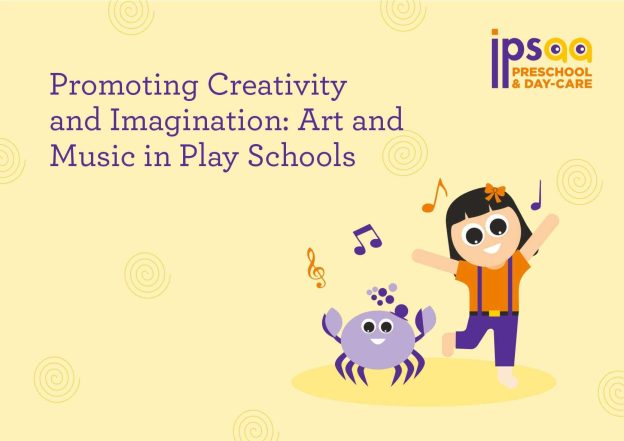Play schools play a crucial role in a child’s early development, providing them with a foundation for future learning. In addition to academic skills, it is equally important to foster creativity and imagination in young children. Incorporating art and music into the curriculum of play schools can have a profound impact on a child’s overall development. In this blog, we will explore the significance of promoting creativity and imagination through art and music in play schools and the numerous benefits it offers to young learners.
Why Your Kids Need Creativity and Imagination?
Creativity and imagination are not just optional skills for children; they are essential for their overall development and future success. Here are some key reasons why kids need creativity and imagination:
Problem-Solving and Critical Thinking: Creativity and imagination foster the ability to think outside the box and come up with innovative solutions. Children who are encouraged to think creatively are more likely to approach problems with an open mind, explore different possibilities, and find unique solutions. This skill becomes invaluable as they face challenges and complexities throughout their lives.
Emotional Expression and Self-Discovery: Creativity provides an outlet for children to express their emotions, thoughts, and experiences. It allows them to communicate their feelings in a non-verbal manner, explore their own identities, and gain a deeper understanding of themselves. Through artistic expression and imaginative play, children can process their emotions, develop empathy, and build self-confidence.
Adaptability and Flexibility: In today’s rapidly changing world, adaptability and flexibility are crucial skills. Creativity and imagination help children develop the ability to adapt to new situations, think creatively about alternative approaches, and embrace change. They learn to see challenges as opportunities for growth, rather than obstacles.
Communication and Social Skills: Creativity encourages children to express themselves in unique ways, fostering effective communication skills. Artistic activities, such as drawing, painting, and storytelling, enable children to convey their thoughts and ideas to others. Furthermore, imaginative play promotes social interaction, cooperation, and collaboration with peers, enhancing their social skills and ability to work in teams.
Innovation and Entrepreneurship: In an increasingly competitive world, creativity and imagination are the driving forces behind innovation and entrepreneurship. Children who develop creative thinking skills are more likely to become innovative problem solvers, entrepreneurs, and leaders in their chosen fields. They have the ability to think beyond boundaries, generate original ideas, and turn them into reality.
Joy, Inspiration, and Well-Being: Engaging in creative activities brings joy, inspiration, and a sense of fulfilment to children. It allows them to explore their passions, discover their interests, and experience the joy of creating something unique. Creative expression has a positive impact on children’s well-being, promoting mental health, reducing stress, and enhancing overall happiness.
Lifelong Learning: Creativity and imagination instil a love for learning and curiosity in children. When they are encouraged to think creatively, they develop a thirst for knowledge, seeking out new information and experiences. This mindset of lifelong learning becomes a valuable asset as they continue to grow and adapt to an ever-changing world.
The Transformative Power of Art and Music in Play Schools
Enhancing Cognitive Development:
Art and music activities stimulate various areas of a child’s brain, promoting cognitive development. When children engage in creative tasks, they exercise their problem-solving skills, critical thinking abilities, and spatial awareness. Art activities such as drawing, painting, and sculpting develop fine motor skills, hand-eye coordination, and attention to detail. Similarly, musical activities such as singing, playing instruments, and rhythm exercises enhance auditory perception, memory, and concentration. By integrating art and music into play schools, children develop essential cognitive skills that will benefit them in their future academic pursuits.
Fostering Emotional Expression:
Art and music provide powerful avenues for emotional expression, allowing children to communicate their thoughts, feelings, and experiences. Through various artistic mediums and musical experiences, children can express their creativity, explore their emotions, and develop a sense of self-identity. Engaging in art and music activities also promotes self-confidence and self-esteem, as children take pride in their creations and accomplishments. This emotional outlet helps children develop a healthy and positive relationship with their emotions, fostering overall emotional well-being.
Cultivating Imagination and Creativity:
Art and music are instrumental in cultivating imagination and creativity in young children. These activities encourage children to think outside the box, explore new ideas, and embrace their imagination. Art allows children to create their own unique visual representations of the world around them, while music enables them to experiment with sounds, rhythms, and melodies. By engaging in creative pursuits, children learn to innovate, problem-solve, and approach challenges with an open mind. Nurturing imagination and creativity from an early age empowers children to become innovative thinkers and fosters a lifelong love for the arts.
Promoting Social Skills and Collaboration:
Art and music activities in play schools provide valuable opportunities for children to interact and collaborate with their peers. Group art projects and musical ensembles encourage teamwork, cooperation, and effective communication. Children learn to share ideas, listen to others, and work together towards a common goal. These collaborative experiences develop important social skills, such as empathy, respect, and cooperation. Additionally, participating in group performances or art exhibitions builds confidence and enhances public speaking abilities, preparing children for future social interactions.
Developing Cultural Awareness:
Art and music expose children to various cultures and traditions, fostering cultural awareness and appreciation. Through art, children explore different artistic styles, techniques, and historical art forms from around the world. Similarly, music introduces children to diverse musical genres, instruments, and rhythms from various cultures. By immersing themselves in different artistic and musical experiences, children develop a sense of cultural diversity, tolerance, and respect for different traditions. This exposure enhances their global understanding and prepares them to be citizens of a multicultural society.
Supporting Overall Development:
The integration of art and music in play schools supports the overall development of children. These activities engage multiple senses, promoting sensory integration and motor skills development. They also stimulate creativity, imagination, and critical thinking, enhancing cognitive abilities. Additionally, art and music contribute to emotional well-being, fostering self-expression, and boosting self-confidence. The holistic approach to education through art and music in play schools ensures that children receive a comprehensive and well-rounded learning experience.
Conclusion:
Promoting creativity and imagination through art and music in play schools is vital for a child’s overall development. These activities enhance cognitive abilities, foster emotional expression, cultivate imagination and creativity, promote social skills and collaboration, develop cultural awareness, and support overall growth. By integrating art and music into the curriculum, play schools provide children with a solid foundation for future academic success, while nurturing their artistic talents and fostering a lifelong love for creativity. Embracing the power of art and music in play schools ensures that young learners are well-prepared to navigate the challenges of the ever-changing world with confidence and imagination.


